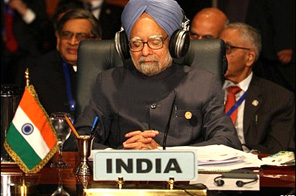Singh under pressure after meeting
NEW DELHI: A rare meeting between the Indian and Pakistani premiers this week ended with a pledge to cooperate on terrorism that has triggered anger and consternation back in New Delhi.
Sections of the Indian media, opposition parties and numerous analysts joined ranks to slam what they saw as major concessions made by Prime Minister Manmohan Singh to his Pakistani counterpart Yusuf Raza Gilani on the sidelines of the Non-Aligned Movement summit in Egypt.
The focus of attention was a joint statement from the two leaders stipulating that action on terrorism "should not be linked" to peace talks between the nuclear-armed South Asian rivals.
Critics interpreted this as a U-turn from India's previous insistence that peace talks could only resume after Islamabad brought to justice those responsible for last year's Mumbai attacks that claimed 166 lives.
"Advantage Pakistan" was the headline verdict of the Times of India, while the tabloid Mail Today thundered "PM sells out to Pak".
India has blamed the assault on India's financial capital on Pakistan-based militants and suggested they were aided by official Pakistani agencies.
On his return from the NAM summit, Singh was given a torrid time in parliament on Friday, with opposition leader L.K. Advani insisting the prime minister had "capitulated".
Singh argued that the joint statement contained no dilution of India's position and promised there would be no resumption of any "meaningful dialogue" until Pakistan fulfilled a commitment to bring the Mumbai attackers to justice and to crack down on militant training camps.
Advani responded by leading a walkout of opposition MPs.
Most observers were equally unimpressed.
India's former envoy to Pakistan, G. Parthsarthy, said Singh had "wrapped himself up in a contradiction" by appearing to de-link the peace talks from terrorism and then backing off.
"We made a diplomatic faux pas and we should admit that," Parthsarthy said.
Former foreign secretary Lalit Mansingh was also critical of the "apparent contradictions" between the joint statement and Singh's subsequent remarks.
"Both the prime ministers (Singh and Gilani) have differing interpretations, which is embarrassing" he said.
Kanwal Sibal, another former foreign secretary, was even more scathing, insisting that the "ill-conceived and badly drafted" joint statement had compromised India's position and made "unnecessary and damaging concessions" to Pakistan.
India and Pakistan launched a peace process in 2004 to resolve all outstanding issues of conflict, including a territorial dispute over the divided Himalayan territory of Kashmir.
India suspended the dialogue after the Mumbai terror strikes which saw Singh's government come under intense domestic pressure to take retaliatory action.
Uday Bhaskar, a New Delhi-based strategic analyst, suggested the furious reaction to the joint statement had been ill-founded and that it actually strengthened India's hand.
"I think we can say from the statement that Pakistan will go ahead with the investigations into the Mumbai attacks and not hold that against the demand that India and Pakistan first solve the Kashmir dispute," he said.
Pakistan has said that it will put the five accused of involvement in the Mumbai siege on trial soon, including the alleged mastermind Zakiduddin Lakhvi.
Bhaskar also argued that any conciliatory moves on Singh's part were aimed at empowering the civilian, democratic forces in Pakistan represented by Gilani.
US Secretary of State Hillary Clinton, who arrived in India late Friday for an official visit, said she had been "very impressed" by the Singh-Gilani meeting in Egypt and saw the joint pledge to cooperate in the fight against terrorism as a positive step forward.
"I really see events moving in a very positive direction," Clinton said in a pre-arrival interview with CNN-IBN television. "In part, because of the shared sacrifice, commitment and understanding that now exists about the threats terrorists pose to both countries."






